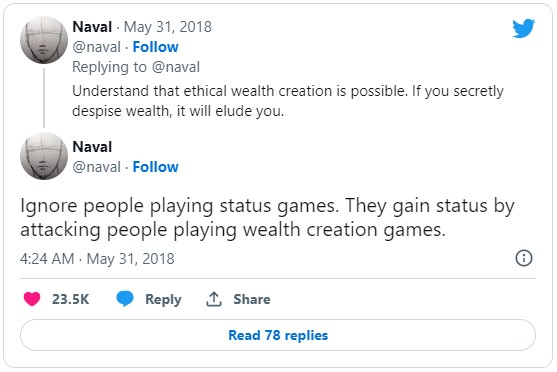We are all motivated by different things.
I’m strongly motivated by freedom in how I spend my time. I was fortunate that I realized this early on in my career.
Whenever job interviewers would ask “what interests you most about this job?” I knew my top answer of “the money” wouldn’t cut it 😂 and that I had to come up with something far more inspiring.
That was the truth though – the money. Money buys you time.
And while I didn’t know the term “financial independence, retire early (FIRE)” yet (it wouldn’t be coined until later), I knew that I wanted it.
I wanted financial independence.
And financial independence is simple – just have more money than you expect to spend in your lifetime! Easy right?
Looking back, it does feel a little bit mercenary to just look at jobs as a way to earn, but it meant that I wasn’t motivated by something far more pernicious – status.
Status games are dangerous and expensive. If you end up playing against someone in a status game, you run the risk of it spiraling out of control. Here’s how to stop and why:
Table of Contents
What are Status Games?
Have you ever heard the idiom “keeping up with the Joneses?” It’s when neighbors compete for the best yard or best TV or best car or whatever. It’s a competition to see who is of higher status – who is doing better in the world.
Sometimes the competition is explicit. Sometimes it’s just internal.
The need for one-upmanship pushes each person to spend more than they otherwise would’ve in pursuit of a “win,” even if it’s only in their mind.
It’s a game with no end.
Status games are bad for many reasons but primarily because they’re expensive. To win, you have to get increasingly expensive goods. When you upgrade the landscaping around your house, you also increase the cost and time of upkeep. When you buy a more expensive car, you increase the cost of insurance, fuel, maintenance, and repairs.
You may also start making irrational decisions simply because you want to prove you’re of higher status. Would you buy a very expensive garment if you weren’t trying to show it off? Would you get that car if no one else was ever going to see it?
Finally, status games are exhausting. If you’re constantly comparing yourself to others, it’s hard to focus on what you are doing.
Why are Status Games Bad?
They’re bad because they don’t end and they’re expensive.
Some of the status games may not be expensive financially but may be expensive in how much time it requires you to “win.”
Take fame for example. With the rise of social media, it’s become easier for someone to get famous on social media. You have folks spending many hours of their life trying to catch fame so they may be able to turn it into something else. For some, it’s money. For others, it’s for the fame itself.
The cost is time. A lot of it.
Consider this quote from Bill Murray in this Esquire interview:
“I always want to say to people who want to be rich and famous: ‘try being rich first’. See if that doesn’t cover most of it. There’s not much downside to being rich, other than paying taxes and having your relatives ask you for money. But when you become famous, you end up with a 24-hour job.”
Bill Murray to Esquire, September 2015
How to Stop Playing Status Games
Everyone compares. It’s natural. It’s also very difficult to break.
I found it useful to think about why I’m comparing myself to others:
- Is it because I wanted validation from others that I am valuable?
- Do I want to be the best at everything?
- Are you motivated by a desire to win and compete with others?
- Do I just like nice things and want others to know?
- Do I need validation that all the time and effort I put into [something] was worth it?
- Do I want everyone to know who I am?
There are a million different reasons we play and yours will be different than mine.
But to come to grips with it you have to recognize you’re playing these games and that you want to stop. If you don’t reach that point, it’s like trying to help someone lose weight when they don’t think they need, should, or want to lose weight.
It will all require you to be introspective and honest with yourself about your motivations.
Once you realize why you’re playing, you need to find out how to stop.
Replace status games with some other “game.”
Human beings have a desire to improve and, to a lesser extent, compete. With traditional status games, you’re competing on who is doing better financially as evidenced by what they buy. The better car is attractive because it shows you’re doing better financially.
Also, it’s fun to compete with others in a meaningful way – even if the stakes are low. This is why board games, fantasy football, and gambling are so much fun for people – it’s low-stakes competition.
Here are some other games you can play that don’t involve buying more stuff.
Fitness Games
Fitness is a game that society values and is beneficial to the winners. Unlike other status games, where you can buy your way to the top (fueled by credit card debt!), you can’t cheat fitness games.
You can’t buy your way to running a marathon or bench pressing your body weight – it requires you to put in the time and dedication. It’s a cost that is not financial (or at least not nearly as high as material status games), it’s your time and energy.
Fitness games can become expensive if you fall down the rabbit hole of buying a lot of gear or joining an expensive gym – but they don’t have to.
You can start running by lacing up and walking out your front door.
Wealth Creation Games
Naval Ravikant is a famed entrepreneur and his thoughts on how to get rich are a very useful read to help build models around money and wealth.
He suggests that status games are for fools and that you should, instead, play wealth creation games. Wealth creation games are those pursuits in which you build a valuable asset that society values.

One of the benefits of wealth creation games is that it’s usually a net positive for the world. You provide more value, you earn more, and the world is a better place for it.
Video Games
Heck, if you just want to beat other people, just play video games. 😂
Remember, Status Decays
If you just want one more nudge away from playing status games, remember that status is fleeting. It’s constantly decaying.
You have to continue to spend and spend and spend to keep up. It’s a never-ending cycle and the things you own will end up owning you.
Play a different game.




Fiona says
Very true – especially the time suck of becoming a social media influencer! I also was just chasing the pay, which has helped now I am FIREd. I didn’t have my value attached to my job, walking away was easy once I knew I had enough money.
Status games are funny – I learned a long time ago that just because you bought a fancier car, there will always be someone else with an even fancier one! I feel better driving my 10 year old Kia around than envy at my neighbors new Mercedes (and the likely payment they have)!